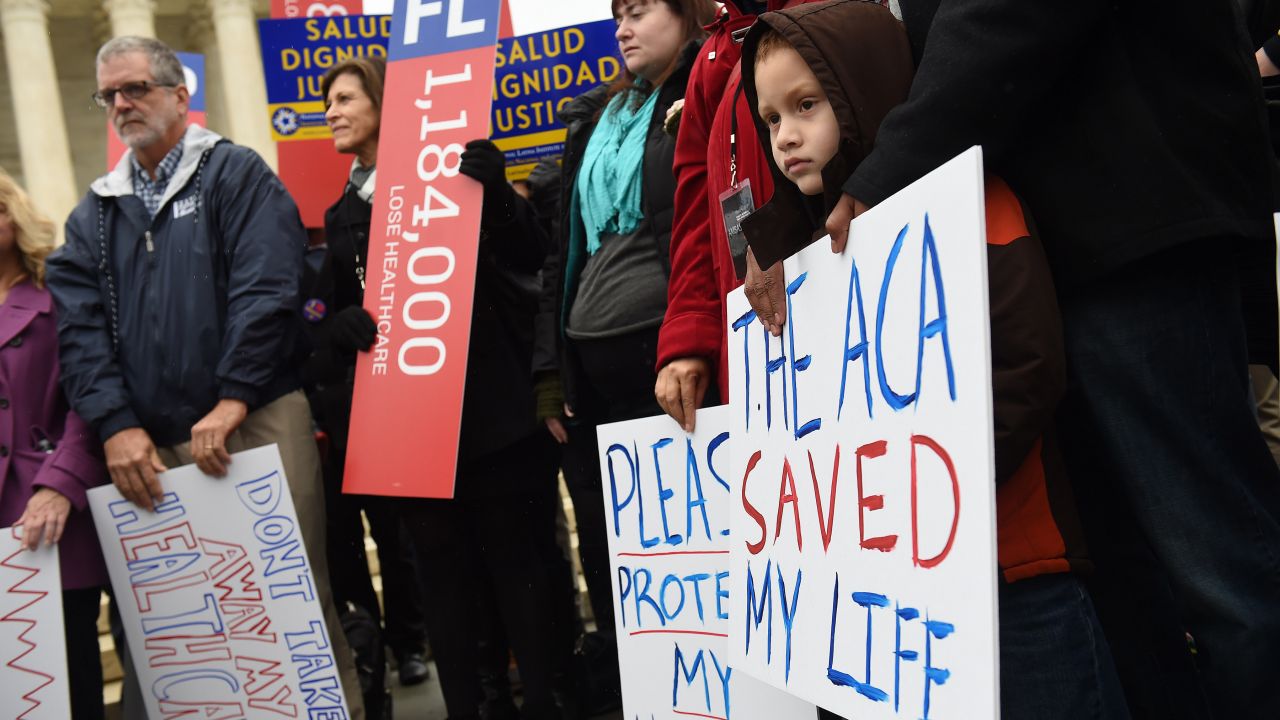
James Cook, 5, stands with his father, Jumaane Cook, as they demonstrate outside the Supreme Court during arguments over a portion of the Affordable Care Act on March 4, 2015 in Washington, DC. (Photo by Matt McClain/ The Washington Post via Getty Images)
This post originally appeared at the Rights & Democracy website.
If you had told me two weeks ago that I would be telling my “health care story” before a standing-room-only auditorium of 1,000-plus people and then again to the policy wonk at my US congressman’s office, I’d have told you that you were nuts. As in, bonkers.
Public speaking, you see, makes me sweat. And possibly vomit. Glossophobia, they call it. I just call it hell.
So you can imagine my response when a volunteer from Rights & Democracy in Vermont, Jessica Early, contacted me about speaking at the Burlington, Vermont, rally in support of Sen. Bernie Sanders’ National Day of Action to Save Health Care on Jan. 15. Thanks to my big, fat Facebook mouth, she had gotten wind of the fact that the only reason I have health care insurance today is because of the Affordable Care Act, and she wondered if I’d be willing to tell my story.
How could she know the very idea would send my stomach churning?
Once I stopped retching, I was left scratching my head. ”I don’t have a compelling health care story to tell,” I said. I was genuinely perplexed.
I told Jessica, nicely, that she had the wrong person for the job, that she should find a single mom with a sick kid, or a nice old man in danger of losing his Medicare. Or a veteran facing cancer treatment. Now that’s compelling, right?
But me? I’m just a single, self-employed science writer who lost her health insurance when she divorced her husband. Not very compelling, right?
My ex worked in health care, and had reallllly good insurance. I’d been self-employed since 1989, and he had always had good employer-based health insurance, so I had never had to think about it. With the divorce, that all changed. It was going to cost me $400 or $500 a month to continue my coverage — not financially feasible for me at the time — so I let it go. To be honest, I wasn’t particularly concerned about it. I’m fortunate to have good health. I’ve never had any significant health issues and I don’t get sick a lot, so I have never been a big “consumer” of health care services.
You know, the kind of person insurance companies love.
Despite my good health and underutilization of health care, I lived with this constant background anxiety around not having health care coverage. There was this ever-present nagging notion that I was just one slip on the ice away from financial ruin. You know what I mean?
So when the opportunity arose to get health care through the Affordable Care Act, I signed up — somewhat begrudgingly. Obamacare, as the Republicans had nicknamed it, was not perfect, by any means. We all knew the insurance company lobbyists had practically written it to serve their own interests. That Big Pharma was still going to gouge us on drug prices. And then there was that penalty … ouch, did that hurt for people like me who were facing it as a reality.
Still, it was something, right? And something was better than nothing.
For me personally, the benefit was clear: the ACA meant the difference between not having health care and having health care.
Having health insurance didn’t drastically change my life. I didn’t suddenly start going to the doctor. I wasn’t diagnosed with some life-threatening illness right afterward, as so many stories go. None of that drama applies. What there was instead was just this subtle sense of pressure relieved, of anxiety lessened. There was the peace of mind that comes with the knowing that — should something happen — I was “covered.”
So at some point during that phone conversation trying to convince Jessica that I was not her poster child for health care and get myself out of this sweat-inducing, stomach-churning public-speaking gig, it hit me: This isn’t about me. It struck me that that single mom with a sick kid? That’s my friend in Barre. And that nice old man whose Medicare is threatened? That’s my 89-year-old-dad on a fixed income in in the Northeast Kingdom.
No, this isn’t about me. And it’s not about you. Nope.
It’s about us. All of us. Each and every last one of us. The young mom working three part-time jobs without benefits to support her kids. The father who can’t retire because he can’t afford to lose health insurance for his family. The retiree who has to choose between her blood pressure medicine and groceries. The college grad with an entry-level job and no more parental safety net. The women who will be forced to pay more just because we are women.
And yes, the self-employed writers and artists and entrepreneurs who are on their own when it comes to health insurance. Like me.
Sign me up, I said. Because if health care becomes something only the wealthiest can afford, that does NOT make America great.
That’s why we fight. That’s why we speak out.
Even if it makes us sweat.



